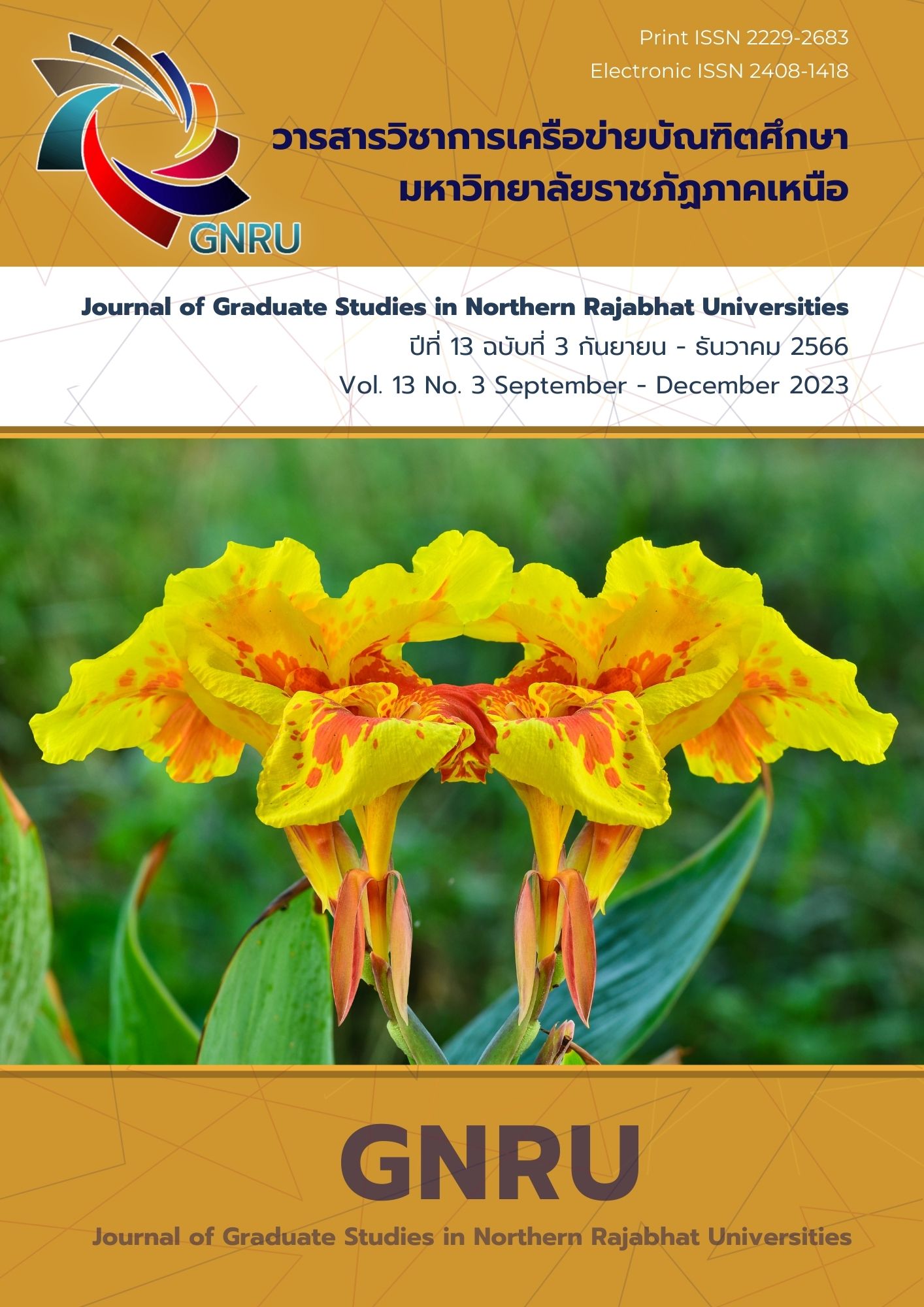8 INNOVATIVE CURRICULUM TO ENHANCES LEARNING EXPERIENCES AND LIFE SKILLS FOR EARLY CHILDHOOD CHILDREN USING SITUATIONAL LEARNING MANAGEMENT IN THE NEW NORMAL ERA
Main Article Content
Abstract
The purpose of this research was to develop and study the results of the use of innovative learning experience and life skills curriculum for early childhood children by using situational learning in new normal. The informants were 10 early childhood teachers and the sample groups were Kindergarten 3 students at Wat Chom Khiri Nakprot Municipality School, totaling 30 students, using the purposive sampling. The research tools consisted of 1) a basic data questionnaire 2) the quality assessment form for the innovation of the enrichment experience program and 3) the recording of the learning experience results. Data analysis by frequency distribution find mean and standard deviation, content analysis and compilation into an essay.
The results showed that : 1) Innovative learning experience and life skills curriculum for early childhood children by using situational learning in new normal consisted of 3components: principles, objectives and structure of the curriculum innovation. It consists of Unit 1: Knowing Safe Rats, Unit 2: Digital Communication, and Unit 3: Knowledgeable Science, overall, the quality is at a high level, and 2) The results of using the innovative learning experience and life skills curriculum for early childhood children by using situational learning in new normal revealed children can play, do activities, treat others, move your body fluently and follow the rules, collage pictures with scrap materials show creativity and imagination through movement, interest, fun, and happiness through art activities, collect materials, equipment, toys, belongings by yourself, sort pictures, match, compare the differences and similarities of things, tell stories, write, speak creatively, explore the world around you, create original creations and design your own solutions based on different situations.
Article Details
References
Clark, B. (1997). Growing Up Gifted (5th ed.). Upper Saddle River, New Jersey: Pretica-Hall.
Elmore, R. (2018). Design as learning, learning as design. In R. Ellis & P. Goodyear (Eds.). Spaces of
teaching and learning: Integrating perspectives on research and practice. Singapore:
Springer.
Groom, J.A., Handerson, D., & Sittner, B.J. (2014). NLN/Jeffries Simulation Framework State of
Science Project: Simulation Design Characteristic. Clinical Simulation in Nursing, 10,
-344.
Khumsuk, W & Nillapun, M. (2021). Simulation-Based Learning. Journal of Council of Community
Public Health, 3(1), 1-11.
Kitipadung, J. (2021). Simulation-Based Learning to Enhance Citizenship in Higher Education.
Journal of MCU Peace Studies, 9(5), 2220 – 2229.
Kokong, K. (2017). Development of a mixed-age curriculum to promote early childhood
development in child development centers. The Journal of Education Mahasarakham
University,11(3), 19 – 35.
Ministry of Education. (2022). Guidelines for organizing active learning (Active Learning) at the early
childhood level. Office Academics and Educational Standards, Office of the Basic Education
Commission.
Nantakhian, W, et al. (2017). Life Skills of Young Learners in Thailand 4.0. Journal of Education
and Social Development, 13(1), 7 – 18.
Office of the Basic Education Commission. (2015). Guidelines for organizing camps to enhance life
skills for Thai children.“Stop problems with the power of children and youth”. Bangkok:
Agricultural Cooperatives Association of Thailand.
Office of the Secretariat of the Education Council. (2019). Understand competencies easily, people's
edition, and understand A simple competency-based curriculum for executive teachers and
educational personnel. Bangkok Office of the Secretariat of the Education Council.
Pilasombat, P, Sawekngam, W & Makanong, A. (2020). Development of the Instructional Process
based on Inquiry Approach and Situated Learning Approach to Promote Ability in
Conducting Research of Student Teachers. Journal of Education Studies, 48(3), 241-257.
Sinthuchai, S & Ubolwan, K. (2017). Fidelity Simulation Based Learning : Implementation to Learning
and Teaching Management. Journal of The Royal Thai Army Nurses, 18(4), 29-38.
Suwankhiri, W, Chulmusi, O & Thitiapa Set up a Vanich shop. (2016). Learning Management Using
Simulation Situation for Nursing Students. Chulalongkorn Journal of Nursing University,
(2), 1-14.
Tawanpatanporn, T. & Sithsungnoen,C. (2018). Development the Supported Experience by Project
Approach with Local Information to Promote Thinking and Problem Solving Ability and
Knowledge Seeking Skill of Early Childhood. Academic Journal of Phetchaburi Rajabhat
University, 8(2), 42 – 51.
Tupmorn, K, Kaewurai, W, Wattanathorn, A & Onthanee, A. (2016). The Development of an
Experiential Model Based on Brain -Based and Cooperative Learning for Science Process
Skills for Early Childhood Students. Journal of Education Naresuan University, 8(2),
– 36.
Wehman, P., Kregel, J. (2020). Functional Curriculum for Elementary, Middle, and Secondary
Age Students with Special Needs. (4th Ed.). Texas: Proed an International Publisher.
Worthington, T. A. (2018). Letting students control their own learning: using games, role-plays, and
Simulations in middle school US history classrooms. The Social Studies, 109(2),
-150.
Yimchang, A. (2019). Development of Life Skills Development Model for Pre-School and
Early Childhood Children Based on Sufficiency Economy Philosophy. Journal of Graduate
Studies in Northern Rajabhat Universities, 10(1), 33 – 48.
Yotthawee, W, et al. (2017). Development of Enrichment Curriculum to Cultivate Awareness
in Values of Life for Nursing Students. Journal of The Royal Thai Army Nurses, 18, 365-


